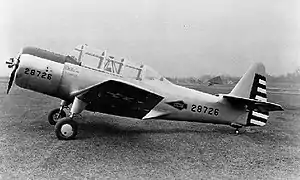| XBT-17 | |
|---|---|
 | |
| Role | Training monoplane |
| National origin | United States |
| Manufacturer | Stearman Aircraft |
| First flight | 1940 |
| Number built | 1 |
The Stearman XBT-17 was a prototype 1940s American two-seat low-wing monoplane primary trainer designed and built by Stearman Aircraft (as the Model X-90).[1] It was evaluated by the United States Army Air Force in 1942 as the XBT-17.[2]
Design and development
The X-90 was a low-wing cantilever monoplane with two-seats in tandem under an enclosed canopy.[1] It had a fixed conventional landing gear and was powered by a 225 hp (168 kW) Lycoming R-680 engine and first flew in 1940.[1] It had wooden wings and a steel tube forward fuselage in order to minimize use of aluminum.[3] In 1942 the aircraft was re-engined with a 450 hp (336 kW) Pratt & Whitney R-985 engine and redesignated the Model X-91.[1] The X-91 was evaluated by the United States Army Air Force as the XBT-17 but no more were built.[1][2]
According to Edward H. Phillips, "At that time, worries at the War Department about a shortage of strategic materials such as aluminum alloy were rampant. The wood/metal composite construction of the proposed monoplane, which required more raw materials than the biplane trainers on an aircraft-by-aircraft basis, was a major factor in the Air Corps' decision not to place the XBT-17 into production, according to a Boeing technical report."[4]
Variants
- Stearman X-90
- Prototype basic trainer with a 225 hp (168 kW) Lycoming R-680 engine.[1]
- Stearman X-91
- The X-90 re-engined with a 450 hp (336 kW) Pratt & Whitney R-985 engine for USAAF evaluation.[1]
- Stearman XBT-17
- United States Army Air Force designation for the X-91.[2]
Specifications (XBT-17)
Data from [5]
General characteristics
- Crew: two
- Length: 27 ft 9 in (8.46 m)
- Wingspan: 35 ft 9 in (10.90 m)
- Wing area: 200 sq ft (19 m2)
- Empty weight: 3,080 lb (1,397 kg)
- Gross weight: 4,150 lb (1,882 kg)
- Powerplant: 1 × Pratt & Whitney R-985-AN-1 , 450 hp (340 kW)
Performance
- Maximum speed: 190 mph (310 km/h, 170 kn)
- Cruise speed: 160 mph (260 km/h, 140 kn)
- Service ceiling: 20,000 ft (6,100 m)
- Rate of climb: 1,300 ft/min (6.6 m/s)
See also
Related lists
References
- Notes
- 1 2 3 4 5 6 7 "American airplanes: Stearman". www.aerofiles.com. 1 December 2008. Retrieved 2010-02-16.
- 1 2 3 Andrade 1979, p. 61
- ↑ Bowers 1989, p.270.
- ↑ Phillips, Edward (2006). Stearman Aircraft: A Detailed History. North Branch, MN: specialtypress. pp. 143–144. ISBN 9781580070874.
- ↑ Bowers 1989, p.271.
- Bibliography